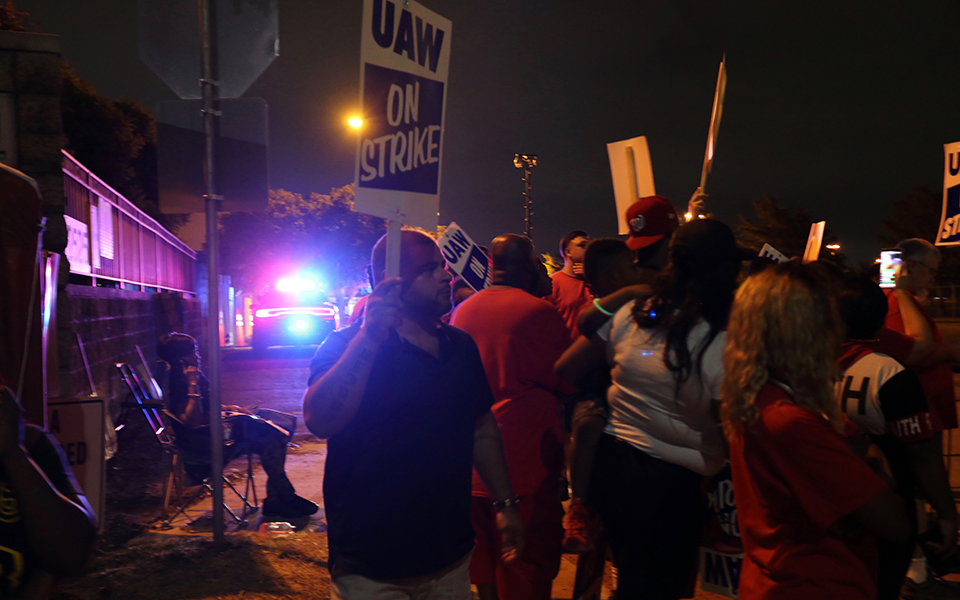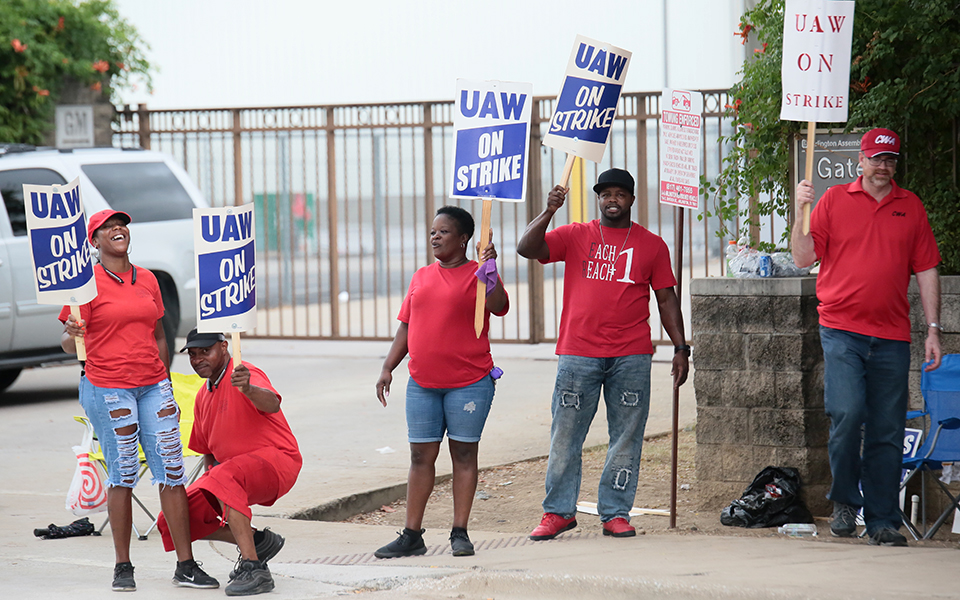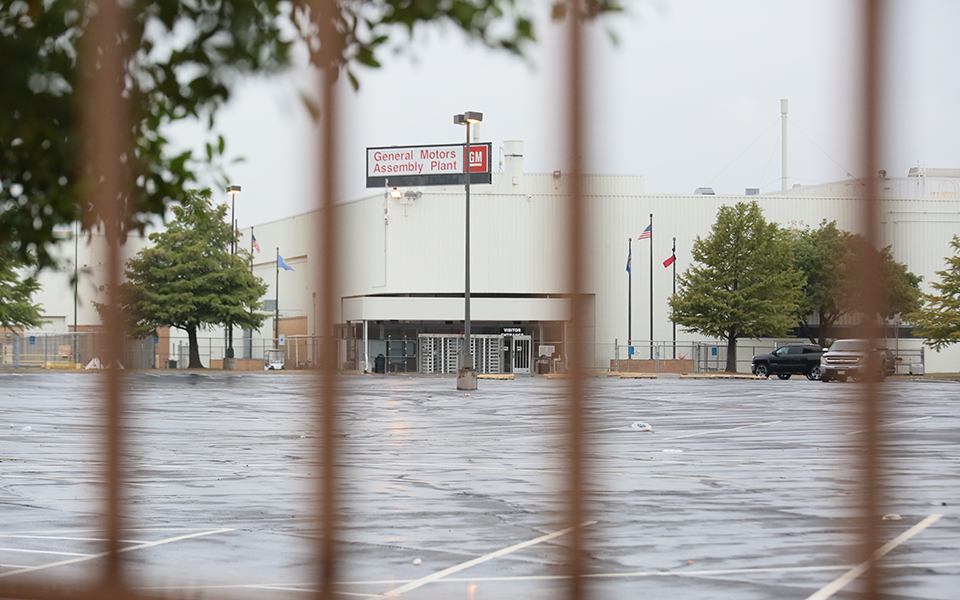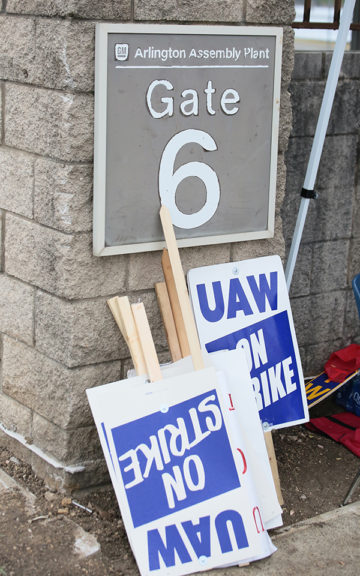The sprawling General Motors Assembly Plant in Arlington, Texas, is a long way from Detroit and the Rust Belt, where both the modern American auto industry and labor movement took root. So when the national United Auto Workers (UAW) called for its 50,000 GM employees to go on strike last week, the nation turned its gaze north—while more than 4,200 workers in the UAW Local 276 walked picket lines deep in the heart of anti-union Texas.
On Thursday night just before 10:30, a crowd of several dozen picketers milled around the Gate 6 entrance at the GM Arlington Assembly Plant. Blue and red flashing lights from Arlington police cruisers cast an ominous glare on the scene. A police officer stood in the middle of the wide entrance leading into the main plant parking lot, alerting UAW picketers that they had two minutes to move from the sidewalk in front of the entrance to behind the metal barricades on either side.
This was the fourth day of the strike, but the first day that police had begun barricading picketers at the gate during shift changes so GM managers and non-union employees could drive in and out without obstruction. If a picketer crossed the barricade, police warned, they would be arrested. That night, tensions were high. Striking workers, who had just had their health insurance unexpectedly cut off by GM the day before, were furious that police—who are fellow union workers—were quite literally breaking their picket line. As a livestreamed video by a picketer showed, the lieutenant in charge continued ordering workers to stand behind a barricade. “That defeats the purpose of us being out here!” one picketer said. “You have one minute and 40 seconds,” the lieutenant responded as he looked at his watch. “Let’s go.”

“It’s a picket. It’s a picket. Do you know the definition of ‘picket’?” another striker yelled in frustration.
The strike, which started on September 15, is the largest one against a U.S. company since 2007, the last time GM workers went on strike. That one only lasted two days.
Workers along the picket lines in Arlington described years of pent-up frustration with how the company has treated them. The high-quality union jobs once associated with the auto industry—the ones with high wages and full pensions—have become scarce, replaced by long-term temp jobs with low pay and few benefits and protections.
“With past strikes, there’s always been a sentiment of, ‘Oh, they’ll work it out.’ This time I don’t feel that at all,” a longtime Local 276 autoworker, who declined to give his name because of fears of retaliation by GM, told the Observer. “I think everyone is ready to dig their heels in and say, ‘We’re done.’ So if you want to go to the mattresses, everyone is ready to do it.”
*
In recent years, the Big Three American car companies—GM, Ford, and Fiat Chrysler—have shuttered union plants across the Industrial Midwest, outsourcing work to third parties and shipping jobs overseas. Meanwhile, foreign car companies like Toyota, Volkswagen, and Nissan have set up production facilities in the non-union South, paying workers less and relying more on temporary labor. That’s given GM a license to claim that the only way it can compete with its foreign competitors’ Southern strategy is join the club, cutting union jobs and jumping into the labor race to the bottom.
The history of the South’s ruthless anti-unionism has deep roots in Texas.

As New Deal reforms allowed labor unions to spread in the late 1930s, union membership in the state exploded. Vance Muse, a virulent white supremacist and New Deal reactionary from Houston, saw this as a political and social threat to Southern segregation. In the 1940s, he began pushing anti-union legislation that prohibits mandatory membership in a unionized workplace, which came to be known as “right-to-work.” Texas was among the first states to pass right-to-work in 1947.
The GM plant in Arlington opened seven years later, in 1954, and was unionized as part of the UAW’s national contract with the company. It has stood as a rare unionized Southern auto plant ever since, forming the backbone of an embattled labor movement in North Texas.
These days, GM’s Arlington factory—which assembles the very popular, very profitable Chevrolet Suburban, GMC Yukon, and Cadillac Escalade 24 hours a day, with three shifts and mandatory six-day workweeks—has turned into a cash cow. In 2017, the Local 276 president at the time said a GM executive had told him that the plant was the “most profitable manufacturing facility in the world.”
The company is now making a lot of money, a big shift from its situation in 2007, when GM was on the verge of bankruptcy and needed a huge government bailout. That year, in an effort to keep the carmaker afloat, UAW workers approved a contract that made major concessions: giving up a pay raise and annual cost-of-living adjustments, agreeing to fewer days off, allowing GM to hire new workers at a lower wage and benefit level, and, eventually, using temporary staffers in the plants. GM promised these changes wouldn’t last forever.
Those concessions, coupled with the massive federal bailout, helped GM recover quite nicely. Since 2016, the company has pulled down a record $35 billion in North American profits. In 2018, GM CEO Mary Barra made just under $22 million—281 times more than the median company worker. Meanwhile, the company has laid off thousands of workers and shuttered several plants while also spending around $10 billion on stock buybacks, which jack up share prices, rewarding investors and senior executives.
Get the latest Texas Observer news, analysis, and investigations via our weekly newsletter:
The union’s recession-era concessions opened a Pandora’s box that workers believe GM has no intention of closing. The hope is that the strike can force GM’s hand and cut workers in on the soaring profits. “Of course we all feel betrayed. They’re making billions of dollars each year. … We’re not asking for anything that wasn’t taken from us,” said the longtime Local 276 autoworker, who declined to give his name because of fears of retaliation by GM.
GM said that it had made a “strong offer” before the union’s deadline that included raises, signing bonuses, and new product investments in plants, though it did not address temps and second-tier positions. “Our goal remains to reach an agreement that builds a stronger future for our employees and our business.”

It takes a heavy toll on workers to keep the Arlington assembly line running around the clock. “People think that we just come in, push a button, and the line runs. That’s not how it works. When we come in to work, we can be constantly on our feet,” the UAW autoworker told the Observer. The repetitive movement slowly grinds the body down. “To get through the day, I have to take four or five Advils. You don’t get the time to heal … you can’t stop and rest because if you stop the lines, the boss is coming out and he wants to know why.”
Meanwhile, the plant’s growth is fueled by precisely the sort of labor-squeezing model that UAW wants to end. GM has leaned heavily on “temporary” workers to fill out the round-the-clock production shifts. There are currently about 800 temps working in the Arlington plant, comprising at least 15 percent of the total labor force. That’s roughly double the share at the average GM plant.
Temps start at $15.78 an hour—half of what a veteran assembly worker makes—and have little in the way of benefits and zero job security. The hope is that GM will eventually hire them on permanently, but that rarely happens. Increasingly, the new generation of American autoworkers are what is known as the “permatemp.”
“We do not know if we’ll ever get hired,” one temp worker told me outside the Local 276 union hall. Some temps, he says, have worked at the plant for as long as five years; he’s been there more than two. For staying in a state of employment purgatory, they are rewarded with 80-cent annual raises and three unpaid days off that must be preapproved. As the worker told me, temps often don’t call in sick or report an injury on the job because they fear it will get them fired.
“It’s borderline inhumane,” he said. “We’re giving our hearts and souls to the company … I don’t see the fairness in that at all. It just looks like a bunch of greed.”
This is one of the main contentions fueling the strike, with UAW demanding a pathway to permanence for long-term temp workers. As one temp worker told me, he was ecstatic when GM first hired him on. He dreamed of building cars. But he doesn’t know if his temporary work status will ever end. He was out on the picket line, fueled by the hope that a successful strike would change his fate.
*
Late Thursday night, when cars started pulling in and out of the Arlington plant, strikers yelled out “Scab!” and pointed out to officers each time a driver made an illegal left turn across the busy thoroughfare. One man in a pickup truck was on his way out, pulling to the edge of the entrance as he waited for traffic to clear on the street. “Damn, man, you’re gonna scab like that?” one picketer asked him from behind the barricade. “Nah, man. They made me work,” he replied, somewhat sheepishly. “Don’t even go in there,” the striker said. “Be with us, man. We out here for you.”
“I feel you, bro,” the driver said as he pulled away.
Tensions continued to increase between strikers and police, particularly with the lieutenant who was in charge of the scene. A handful of picketers started walking from one side to the other on the public sidewalk. “Are they gonna take everybody out here to jail or what?” someone said. The lieutenant briskly walked over to the barricade, saying, “No more crossing. You guys wanna play games? We’re done playing games.” He added, “This is being done my way. That’s how this works.”

When a striker asked why they didn’t have the right to cross on a public right of way, the officer said the picketer was playing “baby games” and that earlier picketers had been intentionally trying to block cars from entering the plant. “You’re not listening to me. I’m done talking to you. Please grow up,” he said when the picketer disagreed with him.
Later, he said, “I can dictate when you go back and forth.”
“This is not a dictatorship. This is America,” a striker said in response. Soon after that, a picketer walked a few feet beyond the barricade. The lieutenant hustled over and hauled her away to a squad car, though she was eventually released.
Arlington police say that they are merely enforcing an agreed-upon arrangement to ensure everyone’s safety. The temporary barricades were part of a “safety plan developed and approved by both GM administration/security and UAW Local 276 to address obstructions on the public roadway,” Arlington Police Department Spokesperson Christopher Cook said in a statement to the Observer.
The police department “remains neutral in the striking activities of UAW Local 276 and respects the rights of both labor and management in this process,” Cook said, and “absolutely respects the right of all individuals to picket, conduct a protest, and freely exercise their rights to assemble within the confines of the law.”
Eventually the police ended the blockade and the striking autoworkers resumed their circular picket line at the gate, chanting “UAW! UAW!” This time, they were provided with a soundtrack booming from the speakers of a car at the picket line across the street: NWA’s “Fuck Tha Police.”
Read more from the Observer:
-
The Green New Deal Can Exist in Texas: The state has already shown what can be accomplished when renewable energy is prioritized. Now, Texans want to take action. Do lawmakers?
-
Some Small Texas Towns Are Declaring Themselves ‘Sanctuary Cities for the Unborn’: Frustrated with the Legislature, Texas city officials are taking on abortion rights through local policy measures.
-
Climate Change Will Make Harmful Algae Blooms in Texas Waterways More Common: Blue-green algae exists in almost all of the state’s waterways. Once it starts to bloom, it’s hard to get rid of it.








